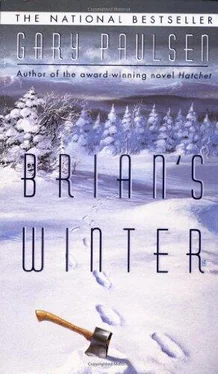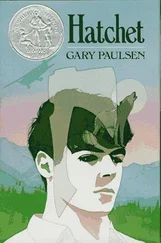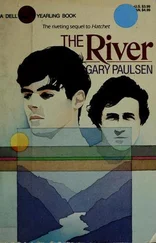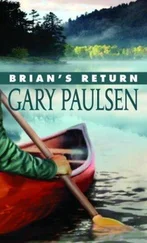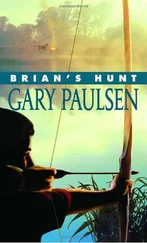The freezes at night had done away with the flies so they didn’t bother the meat and he spread the pieces out to give them air and by the middle of the afternoon he could see they were drying into a kind of jerky in the sun. But before that he went to work on the bones. There was still a lot of meat on them and he chopped them up with the hatchet and kept a pot boiling all day to boil the meat and marrow from them. When it was finally done — again, in late afternoon — he was surprised to see the liquid in the pot become semihard, like Jell-O, and turn into a thick mass full of bits of cooked meat.
This he ate for the evening meal — or about half of it — spooning it in thick glops, and when he was at last back in his shelter, the meat stored safely in the rear and the pot set aside from the fire for the night (still half full) he felt like the richest man on the earth.
It was very hard to concentrate on working. Everything in him wanted to sleep now — he’d never been so full and the shelter was warm and snug and all he really wanted to do was close his eyes and sleep and end the day.
But he could not forget the bear attack, or the rain and cold, and he knew that the good weather and his luck wouldn’t last and he had really no time to waste.
He took the arrows out and rummaged around in the survival pack for his feather stash. He had found early on that foolbird feathers from the wing and tail worked the best for arrows and he had saved every wing and tail feather from every foolbird that he had shot and he took them out now.
These arrows were different. They were heavier and he worried that the width of the point would catch the air and counteract the feathers in some way. The solution, he felt, was to make the feathers longer.
He selected only two feathers for each arrow but left them a full six inches long and shaved a flat side with the knife the full length of each feather so that it would fit the arrow shaft.
He attached the arrows with pieces of thread from his old windbreaker, wrapping them at the front and the rear and then smearing them with bits of warmed pine sap — a trick he had learned when he had leaned against some sap on a tree and stuck to it — to protect the thread.
He did three arrows, working slowly and carefully before going at last to sleep. Once again he slept so hard that he awakened with his head jammed into the ground and his neck stiff from not moving all night.
Because of all the meat from the doe he did not have to hunt for days now, at least ten or twelve, maybe two weeks, and he worked all day on the arrows and bow, sitting next to the shelter in the warm sun, snacking on the jellied meat now and then.
By dark this day all nine arrows were finished. He had used the hunting knife as a scraper to shape the limbs of the bow more equally and to put in notches for the string to get it ready to string the next day for the first shooting trials. He was just leaning back, half cocky about how well things were going, when he smelled the skunk.
He had run into skunks before, of course, saw them all the time, but had only had the one really bad experience when he got sprayed directly. He knew they moved at night, hunting, and didn’t seem very afraid of anything. He looked out of the shelter opening carefully.
The skunk wasn’t four feet away, looking in at him at the shelter and the fire and as he watched, it whipped up its rear end and tipped its tail over and aimed directly at his face.
I’m dead, he thought, and froze. For a long time they stayed that way, Brian holding his breath waiting to be nailed, and the skunk aiming at him. But the skunk didn’t spray, just aimed and held it.
He’s hungry, Brian thought. That’s all. He’s hunting and he’s hungry. Slowly Brian reached to his right, where the meat was stored back in the corner, and took a piece of the venison. With a smooth, slow movement he tossed the meat out to the right of the skunk. For a split second he thought it was over. The skunk’s tail jerked when the meat hit the ground but then its nose twitched as it smelled it and it lowered its tail, turned and started eating the meat.
Brian carefully reached out to the side and pulled the door back over the opening and left the skunk outside eating.
Great, he thought, crawling back into his bag to sleep — I’ve got a pet skunk who’s a terrorist. If I quit feeding him he’ll spray me. Just great. His eyes closed and he sighed. Maybe he’ll be gone in the morning.
In the morning he pushed the door to the side gingerly, looking both ways. He didn’t see the skunk and he pushed the door all the way open and went outside. Still no skunk. Before heading back for the trench he had dug for a toilet he pulled the door back over the opening — no sense taking chances — and then trotted off into the woods.
When he came back he looked all around the area and still couldn’t see the skunk and he shrugged. It must have moved on.
He kindled an outside fire using coals from the shelter fire and soon had a small cooking fire going. The cold lasted longer now into the morning and the ice had moved farther out into the lake, almost forty feet from the shore all around. The rabbit-skin vest and the fire felt especially good.
He took the last of the jellied meat in the pot, added a piece of red venison, and put it on the side of the fire to cook while he took stock of his situation. The shelter was done, or as done as he could get it, and almost airtight and warm when he had a fire going inside. He had nine arrows finished, which seemed like a lot. How many times would he have to defend himself? Besides, even if he used all the arrows he could get more tips from the arrow stone, and the wood shafts would be there in the winter as well.
Winter.
The word stopped him. He knew nothing about it. At home in upstate New York, there was snow, sometimes a lot of it, and cold at times, cold enough to make his ears sting, but he could get inside, and he had good warm clothes. Here, he suspected, the winter would be a lot worse, but he didn’t know how much worse or how to prepare for it.
Just then the meat was done and at exactly that moment, as he pulled the pot off the fire, the skunk came waddling around the end of the rock, stopped four feet away and raised its tail.
“What…” Brian winced, waiting, but the skunk did not spray and Brian took a piece of meat from the pot and threw it on the ground next to it. The skunk lowered its tail, smelled the meat, and when it proved too hot to eat, it backed away and raised its tail again.
“Listen, you little robber — I’m sorry it’s too hot. You’ll just have to wait until it cools…”
The skunk kept its tail up, but lowered it a bit and seemed to understand, and in a moment when the meat cooled it picked up the chunk and disappeared with it around the corner of the large rock that was the back wall of Brian’s shelter.
“Where are you going?”
Brian stood up and followed at a distance, moving slowly, and when he came around the rock the skunk was gone, disappeared completely.
“But…”
Brian walked all around the end, back again, and was on his second loop when he saw some grass wiggling at the edge where the rock met the ground. The grass here was thick and about a foot tall and hid the dirt from view. Brian moved closer and saw some fresh earth and a hole beneath the rock and as he watched he saw black-and-white fur moving down inside the hole.
“You’re living here?” Brian shook his head. “You’ve moved in on me?”
The skunk stopped moving inside for a moment, then started again, and while Brian watched, little spurts of dirt came out of the entrance as the skunk dug back in under the rock.
Читать дальше
